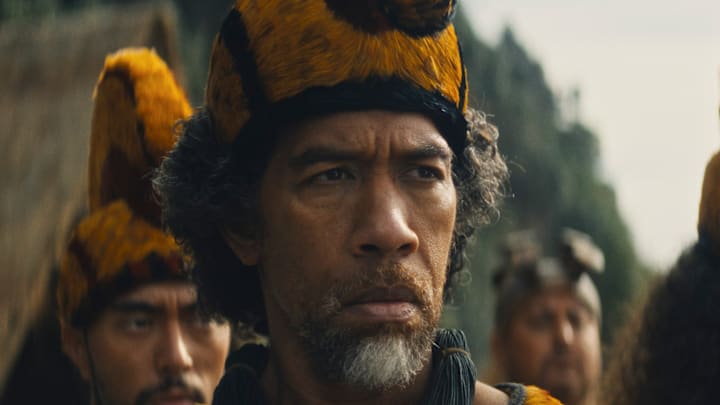In episode 7 of Chief of War on Apple TV+, the story shifts its focus away from the internal political strife that has beset the islands. The threats of Keoua and Kahekili take a back seat to another threat to the Kingdom of Hawai'i.
Captain Cook discovered the Hawaiian Islands in 1978. He returned in 1779, but he didn’t find the people as docile as he had thought. He was killed on the islands. In Chief of War, his ship, under the command of Captain Meares, returns to resupply before heading on to Alaska. The Europeans are wary, and for good reason. They were chased off the islands, accidentally leaving John Young behind, but rescuing Ki'aini from King Kahekili’s men.
During their travels, one of Meares’s men, Marley, steals the charts to Hawai'i for an American merchant, Captain Metcalfe. As episode 6 ended, Metcalfe and Marley approached the islands. Meares’s ship had already dropped off Ki'iani and moved on.
Chief of War episode 7 key moments

Marley’s sole intent is to help Captain Metcalfe exploit the islands for profit. They want to be the first to gain a foothold on the islands and control the trade.
When they arrive, Metcalfe and Marley lead a group of men ashore. After spotting a Hawaiian lad, they give chase, with the intent to kill, but the youth leads them into a trap. The white men are surrounded and led to Kamehameha. Metcalfe convinces Kamehameha that they come in peace and want to trade, but Ka'iani and Tony insist they are more dangerous than they seem. Even John Young is reluctant to trust them completely, but doesn’t speak out against them either.
Ka'iani decides to take matters into his own hands. He takes Tony and Nahi to the ship to kidnap Marley for his part in Tony's enslvement in Zamboanga. Kamehameha is warned about the mission and interrupts it, sending Ka-'iani and his chorts ashore, while Kamehameha apologizes to Captain Metcalfe.
Ka'iani is furious. Only his family knew about his excursion. At first, he accuses his brother Namake, but the latter is adamant that he did not tell Kamehameha. Ka'iani realizes it is his own wife who betrayed him. She is bitter because she split from Namke when Ka'iani returned. She had moved on with Namake because they both thought Ka'iani was dead.

While Kupuohi dutifully returned to her husband upon his return, she sensed how he had changed, and she missed being with Namake. Kupuohi is also aware of the closeness Ka'iani has with Kamehameha's wife Ka'humanu. This leads to torn allegiances, and she betrays her husband.
After pulling Ka'iani from the ship, Kamehameha sends Young to inform Metcalfe that he can resupply his vessel with food and water, then to move on. While Kamehameha wants to offer them peaceful hospitality, he doesn’t totally ignore Ki'iani’s warning.
Young delivers the message, and the sailors return to their ship. Instead of sailing away, however, they move toward another bay, where peaceful farmers and fishermen live with their families.
Metcalfe turns the broadside of his ship toward the beach and orders his men to load their cannon with cannisters of nails. Even Marley balks at this cruelty. He understands these aren’t warriors, but families. Metcalfe is out to prove a point and has his men fire their cannon repeatedly.
It is a brutal scene because when these canisters are fired, they explode, spreading out the nails with tremendous force. The nails rip into the watching, curious Hawaiians, tearing them to shreds. After a few rounds, the captain orders his sailors to set sail, but first, he kicks Marley off his ship.
While this scene is particular to this story, it reflects the attitude toward natives all over the world after their discovery by Europeans. In Mexico, South America, North America, Africa, and Asia, the so-called Christian, European (and later American) explorers and merchants conqueror lands and their native people, by force.
In many instances, European diseases, previously unknown in lands that had been isolated from the world, decimated the native populations, who had no immunity to these diseases. Hawai'i is no different. Whether or not Chief of War has a chance to illustrate this adequately in the narrative remains to be seen, but it happened in Hawai'i just as it did across the world.
The unification of the kingdoms of Hawai'i came a few too many decades too late, but the end results would have been the same. The modern weapons were going to overpower those of the native people, as had happened throughout the course of history.
The appearance of the foreign sailors likely accelerated the need for unification, but that story will be told in the final two episodes.
For more Winter is Coming content directly in your Google feed, add us as a preferred source!
Episode score: A
While it is tough to watch this episode, it highlights the brutality and greed of European and American explorers and merchants toward native peoples, not only in Hawai'i, but elsewhere. The final scene is not for the faint of heart, but it also isn't too gruesome to watch. It is heartbreaking to be sure, and the results are clear, without the gore.
More Chief of War reviews:
